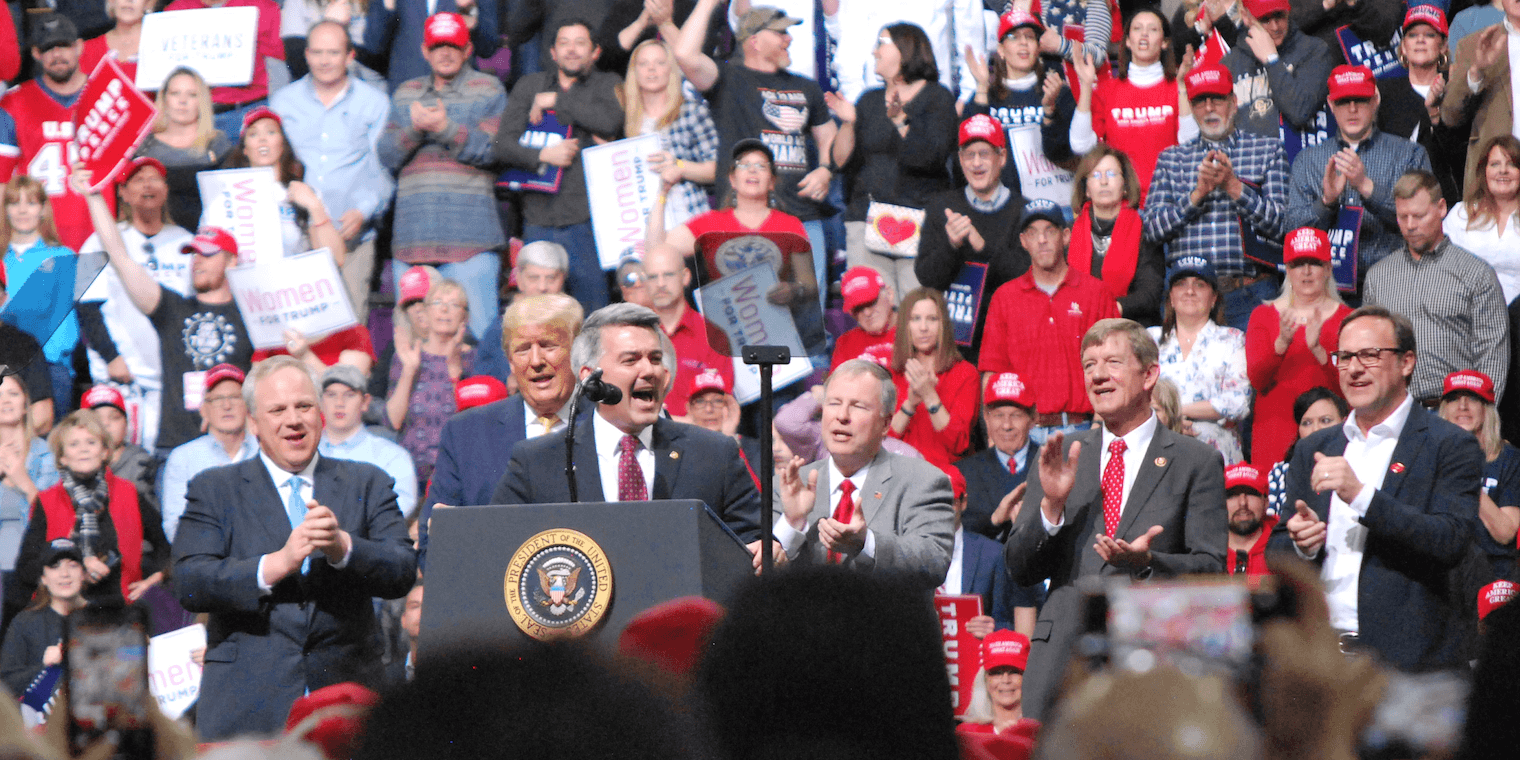Asked earlier this month about President Donald Trump’s handling of the Russian bounty scandal, U.S. Sen. Cory Gardner (R-CO) launched into an attack on Russia, instead of criticizing the president, and shifted blame to the left, saying Speaker of the House Nancy Pelosi (D-CA) and Senate Minority Leader Chuck Schumer (D-NY) had the same U.S. intelligence showing Russia paid bounties to Taliban-linked mercenaries to kill U.S. troops in Afghanistan.
Gardner’s criticism of Russia, not Trump, mirrors Gardner’s pattern in similar situations where both Russia and Trump have faced scrutiny.
In an interview with KOA News Radio on July 2 Gardner was asked if the bounty story gave him pause about throwing his support behind the president.
“Is there any doubt that people are trying to kill American soldiers in Afghanistan?” Gardner replied on air without directly answering the question. “Is there any doubt the Taliban has been trying to kill American soldiers in Afghanistan? Is there any doubt Russia has been involved in this effort in Afghanistan? No. This is the same intelligence information that Nancy Pelosi and Chuck Schumer had.”
Pelosi said in a press conference on July 2 that she did not know about the bounties, and Schumer hasn’t commented.
“I didn’t know about it but I will say this: It was of a consequential level that the intelligence community should have brought it to us in that way,” Pelosi said, referencing the verbal briefings given by intelligence officials.
It is clear that information about the bounties was included in the President’s Daily Brief (PDB) on Feb 27, but Trump did not read the document. According to the Associated Press, top officials in the White House knew about the bounties in early 2019.
A Familiar Strategy
In his KOA interview, Gardner touted his own record on Russia, saying he sponsored a 2019 bill to increase sanctions on the country and in 2018 wrote an op-ed in the New York Times pushing for the U.S. to designate Russia as a state-sponsor of terror. In both the bill and the op-ed, Gardner employed a similar strategy of ignoring Trump’s friendship with Russian President Vladimir Putin, and his role in attacks on the United States, and just focusing on critiques of Russia.
In a July 1 interview on Colorado Public Radio’s (CPR) Colorado Matters, Gardner employed the same evasive tactic when asked if Trump should have retaliated against Russia for the bounties.
“Specifically, on the question of the bounties though, should the President have retaliated against Russia to send a clear message about those particular payments?” Colorado Matters’ Ryan Warner asked.
“Well, I think we should always go after people, whether it’s Russia or anyone else who is trying to attack U.S. soldiers or interests, and I think that’s the same information that Chuck Schumer and Nancy Pelosi had as well,” Gardner said. “It’s why I’ve acted very swiftly and strongly on sanctions against Russia. It’s why I’ve introduced legislation to pursue additional sanctions on Russia and also to name them a state sponsor of terror. So, Russia’s activities deserve strong and certain retaliation, and that’s why I’ve introduced this legislation.”
After Mueller Report, Gardner Attacked Russia, Not Trump
After the release of the Mueller report in 2019, Gardner avoided mentioning Trump and focused his attacks instead on Russia. In a Politico article following the release of the report, Gardner dismissed Trump’s misbehavior and said the focus should be on Russia’s efforts to meddle in U.S. elections.
“Look, it’s clear there were no merit badges earned at the White House for behavior,” Gardner told Politico. “You have to focus on the heart of this conclusion, which is there is no collusion, no cooperation. That’s where the focus ought to be and how we prepare for the next elections to protect us from Russian intrusion and interference.”
“Unverified Intelligence”
Democrats have criticized Trump’s reaction to the intelligence about the Russian program. For example, Pelosi and Schumer released a statement disparaging Trump’s lack of response to the scandal.
“Our Armed Forces would be better served if President Trump spent more time reading his daily briefing and less time planning military parades and defending relics of the Confederacy,” the statement read.
The White House’s official explanation of why the president was not verbally briefed was that the information was not verified and that unverified intelligence does not make it to the president.
U.S. Sen. Ron Johnson (R-WI) vehemently defended Trump in a statement to National Public Radio.
“Listen, the president has got a big job — he can’t be made aware of every piece of unverified intelligence,” Johnson said, “OK? And that’s what this was, unverified intelligence.”
Members of the GOP have tried to shift the blame away from Trump to Pelosi, the New York Times, or former President Barack Obama.
Gardner, on the other hand, said Trump should be reading his daily briefings before referring back to his Russia bill.
“Of course, the President needs to read the daily briefs,” Gardner said. “You’d have to ask him. I’m not the President obviously. And what I hope that we can continue to do is work together on legislation. My bill is bipartisan to name Russia a state sponsor of terror.”
Pelosi, in her press conference on July 2, fought back against the idea that the President would only be served verified intelligence in his briefings and said that Trump should have been briefed. In a New York Times op-ed Douglas London, a former CIA counterterrorism chief who oversaw operations and intelligence concerning Afghanistan, echoed Pelosi’s statement.
“The goal is to provide the president with information on developments that may significantly affect U.S. interests,” London wrote. “With this information, the president and his team can take any necessary action against potential threats. The government can’t wait for complete certainty; by then it would be too late to do anything about it.”
Ned Price, former National Security Council spokesman who gave daily briefings to Obama, did not believe the information was even unverified, according to a report from Voice of America.
“[Senior administration officials] had staked out positions on how to respond to Russia,” Price said. “If this truly were raw, uncorroborated reporting, there wouldn’t have been high-level policy discussions regarding a response.”
Trump and Putin
American intelligence agencies have known for almost a decade that Russia has been supporting the Taliban in Afghanistan. Russia began sending weapons and other supplies eight years ago. The main issue, even more important than if Trump needed to be briefed on the bounty scandal, is that Trump has refused to speak out against Russia’s actions, according to U.S. intelligence officials cited in an NBC News article.
According to the Washington Post and The Guardian, Trump and Putin’s relationship has made intelligence officials reticent to deliver information to Trump that is negative towards Russia.
An article from Just Security pointed out that Trump has overtly embraced Putin and even directed C.I.A. officials to share intelligence information with the Kremlin despite no discernible reward.
In June, Trump removed 9,500 U.S. troops from Germany, a move that many Germans saw as playing into Putin’s hands. Trump has argued that the troops are expensive and should be provided, if necessary, by Germany.
Trump has also advocated for Russia to rejoin the G8 Summit, now called the G7 after Russia was kicked out after its annexation of Crimea. Pelosi brought this up in her press conference.
“What is important is the President’s relationship with Russia,” she stated. “This is not a good time for you to be saying Russia should be part of the G-8 when in fact there is reason to suspect that Russia was threatening the security of our men and women in uniform.”
The history of Trump and Putin’s friendship has led to concerns that Trump was aware of the bounty scandal and purposefully ignored it. The C.I.A., the state department, officials in the U.K., and officials in the White House were all aware of the bounties since 2019. London, whose role with the C.I.A. included keeping tabs on Russia, does not believe Trump could have been unaware of the scandal.
“Yes, he was most certainly aware of Russian assistance to the Taliban,” London wrote in his op-ed. “Despite that knowledge, he chose to do nothing.”
The White House has maintained that Trump was not aware of the bounties. Schumer, however, suggested that something was up in a speech on the Senate floor June 29.
“Something doesn’t smell right here, especially when we have a president and an administration that has a great deal of trouble telling the truth.”




